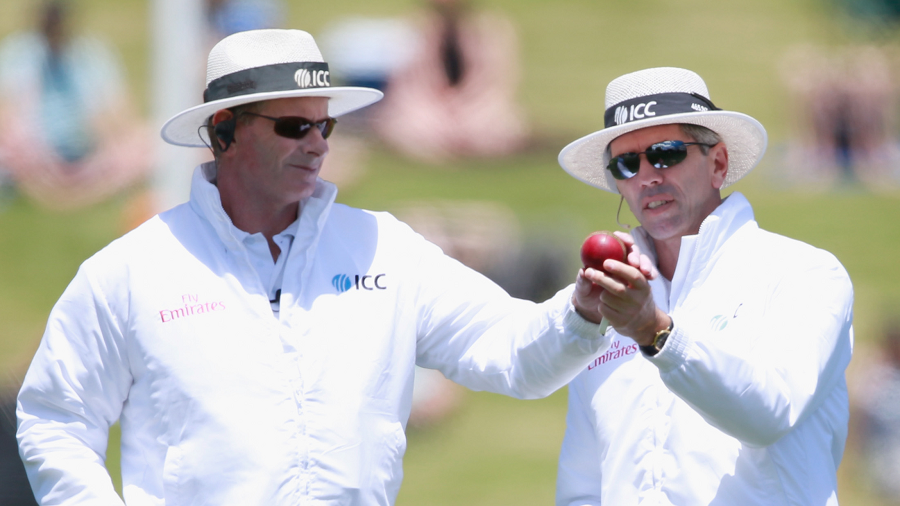The MCC, through its World Cricket Committee, has called for the ICC to speed up restarts after DRS reviews, and tighten up the DRS process itself, in a bid to address the issue of slow over rates in the game.
The MCC, the keeper of the laws of cricket, made the recommendations following research into how much time was lost on each day’s play during New Zealand’s three Tests in England in June. It has also recommended that umpires enforce the laws of the game relating to penalty runs for repeated time wasting more strictly, and time drinks breaks better.
The recommendations were made with a specific focus on Test cricket.
How to make the DRS quicker
The recommendations to streamline DRS processes were twofold: one, to ensure the players don’t inadvertently waste time around reviews, and two, to ensure the umpires do not go through unnecessary steps during the review process.
“In general, [the MCC recommends] ICC playing regulations be reviewed to tighten the parameters around when substitutes are permitted onto the field of play i.e. with gloves, drinks etc,” the MCC’s statement said. “More specifically, when a not-out decision is reviewed by the fielding side (or when an umpire review is made with a not-out soft signal), the fielding team should immediately return to their positions, ready to bowl the next delivery.
“Batters should also remain in the proximity and prepare to recommence play. No drinks should be brought onto the field. If the decision is overturned to out, the fielding side will still have time to celebrate.”
To speed up DRS reviews, the MCC recommended that the “standard protocol should be cut short as soon as the TV production team is aware that it will be not out. For example, time is often spent trying to discern an inside edge for lbws, only to see that the ball was missing the stumps. As soon as the ball tracking has been loaded, if it will result in a not-out decision, the TV umpire should be informed immediately.”
Penalty runs for time wasting
Significantly, the MCC wants umpires to more actively enforce the laws of the game that are concerned with time wasting. Law 41.9 and 41.10, which deal with delays by the bowling and batting side respectively, allow the umpire to issue an official warning if they “consider that the progress of an over is unnecessarily slow, or time is being wasted in any other way”, followed by five penalty runs for a repeat offence.
Law 41.9 further says: “If the waste of time is during the course of an over, [the umpire will] direct the captain of the fielding side to suspend the bowler immediately from bowling. The bowler thus suspended shall not be allowed to bowl again in that innings.”
Drinks to go with the flow of the game, not interrupt it
The MCC’s research found that during the Tests, drinks were “taken at scheduled times regardless of what happened in the previous hour e.g. even if wickets/reviews meant drinks had been taken recently.”
To cut down on time lost to this, it said drinks intervals should be adjusted to coincide with other naturally occurring breaks in play. “Drinks intervals should be taken immediately if a wicket falls or a DRS review is made within 15 minutes of their scheduled time, and not re-taken at […] at the next scheduled break.”
Where exactly is time lost during a game?
The MCC found that on average, 31.5 minutes were lost on each full day of play at the England-New Zealand Test series. Of this, the time taken to reset between overs was the major source of delay, with
In comparison, the MCC’s research found, “the average change between overs in Test cricket took 10-15 seconds longer than in County Championship cricket… The average ‘standard’ change of over (without a new bowler or batter) was 55 seconds in Tests and 45 seconds in county cricket.”
Breaking down the time lost to the DRS process further, the MCC noted “there were approximately 64 minutes lost during the series to the DRS, which consisted of the following: player discussions where no review was taken (six minutes), player reviews (47 minutes) and umpire reviews (11 minutes).
“It took an average of 25 seconds for the fielding side to be ready to bowl the next ball after the DRS had confirmed an umpire’s not-out decision.”
Mike Gatting (chair), Jamie Cox, Suzie Bates, Alastair Cook, Kumar Dharmasena, Sourav Ganguly, Tim May, Brendon McCullum, Ramiz Raja, Kumar Sangakkara, Vince van der Bijl and Cricket West Indies president Ricky Skerritt.
